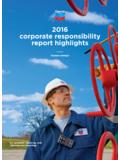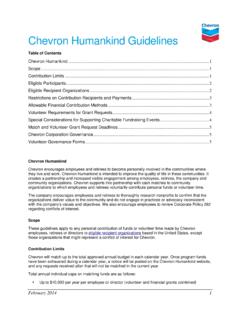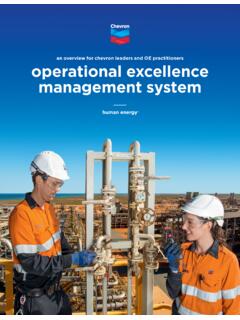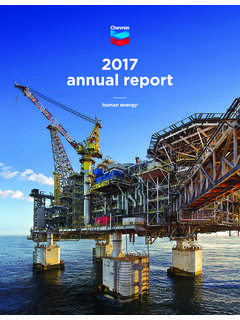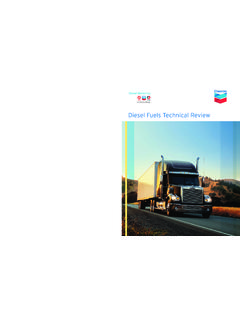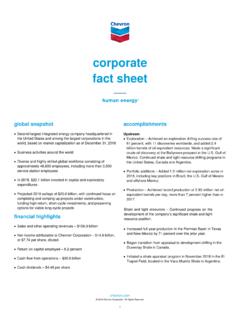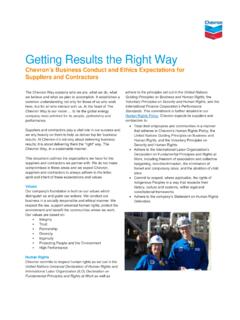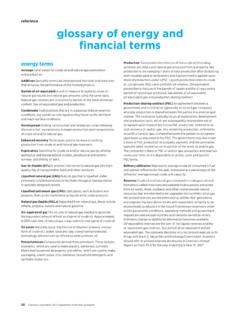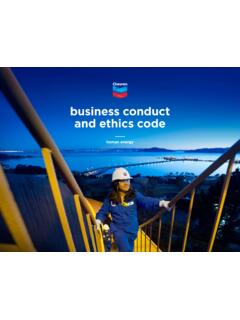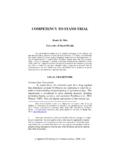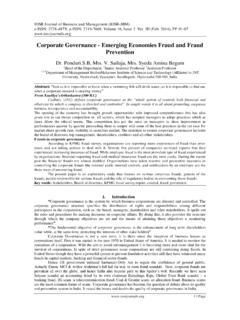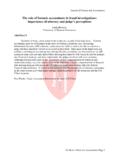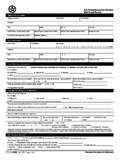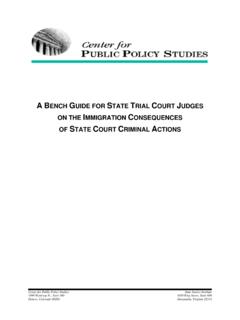Transcription of The Facts About The Legal Fraud of the Century
1 September 2017 The Facts About The Legal Fraud of the Century The false allegations against chevron corporation in Ecuador have been called the Legal Fraud of the Century by the Wall Street Journal. Here are the Facts : In February 2011, an $18 billion judgment (later reduced to $ billion) was issued by an Ecuadorian court against chevron corporation , claiming chevron was responsible for alleged environmental and social harms in the Amazon region of Ecuador. chevron appealed the ruling on the grounds that it lacked scientific merit and ignored overwhelming evidence of Fraud and misconduct. However, in January 2012, an Ecuadorian appeals panel upheld the lower court judgment. Based on overwhelming evidence of Fraud and misconduct throughout the Ecuadorian lawsuit and trial, chevron initiated a civil lawsuit in the District Court for the Southern District of New York.
2 In March 2014, the court ruled that the Ecuadorian judgment was the product of Fraud and racketeering activity, finding it unenforceable in the United States. The nearly 500-page ruling found that Steven Donziger, the lead American lawyer behind the Ecuadorian lawsuit, violated the federal Racketeer Influenced and Corrupt Organizations Act (RICO) in obtaining the Ecuadorian judgment. Among other things, the court found that Donziger committed extortion, money laundering, wire Fraud , Foreign Corrupt Practices Act violations, witness tampering and obstruction of justice, and that he tried to cover up his and his associates crimes. The court found that Donziger and his team wrote the [Ecuadorian] court s Judgment themselves and promised $500,000 to the Ecuadorian judge to rule in their favor and sign their judgment.
3 As federal judge Lewis Kaplan stated in the court s ruling: The wrongful actions of Donziger and his Ecuadorian Legal team would be offensive to the laws of any nation that aspires to the rule of law, including Ecuador and they knew it. Indeed, one Ecuadorian Legal team member, in a moment of panicky candor, admitted that if documents exposing just part of what they had done were to come to light, apart from destroying the proceeding, all of us, your attorneys, might go to jail. It is time to face the Facts . This decision was unanimously affirmed by the United States Court of Appeals for the Second Circuit in August 2016. It affirmed the factual findings made by the trial court, noting that Donziger and the Ecuadorian plaintiffs did not challenge the trial court s factual findings.
4 The appeals court stated that Donziger and his team engaged in a parade of corrupt coercion, Fraud and bribery. In June 2017, the United States Supreme Court denied a petition seeking review of the appeals court s decision. As a result, the Legal system has finally and conclusively found that the Ecuadorian judgment is the product of Fraud and bribery. Firsthand Accounts of Corruption During the racketeering trial against Steven Donziger and his team, chevron presented unrebutted evidence detailing the extent of the fraudulent acts undertaken and directed by Donziger, including fabricating environmental evidence, pressuring scientific experts to falsify reports, plotting to intimidate judges into handing down favorable rulings, bribing court-appointed experts, ghostwriting court reports and even drafting the final judgment.
5 chevron called 24 witnesses, offered deposition testimony from 21 others, and offered more than 3,000 exhibits into evidence. Testimony included those formerly aligned with the plaintiffs, who provided firsthand accounts of corruption: Ghostwriting: Donziger s own environmental consultants, from Stratus Consulting, provided sworn testimony disavowing their work and affirming that there is no scientific merit to the plaintiffs damages claims against chevron . o In sworn declarations (here and here), senior Stratus executives detail the role the firm played, along with Donziger and his team, in ghostwriting a damages report for a supposedly independent court-appointee. In their declarations, the executives state that "Stratus is not aware of any scientific evidence that people in the former concession area are drinking water contaminated with petroleum" and that they are not aware of any scientific data that shows that any adverse health effects are caused by contamination from petroleum operations in the Oriente.
6 Bribery: Alberto Guerra, a former Ecuadorian judge who once presided over the case, testified that the judge who issued the judgment against chevron was promised a $500,000 bribe by Donziger and his team in exchange for allowing them to ghostwrite the judgment against chevron . o Guerra, who presided over the case when it was first filed in 2003, revealed that he was paid thousands of dollars by Donziger and his team and a subsequent judge, Nicolas Zambrano, for illegally ghostwriting judicial orders issued by Zambrano and steering the case in the Ecuadorian plaintiffs' favor. Guerra testified under oath that Donziger and his team were permitted to draft the judgment in their favor after they promised to pay Zambrano a $500,000 bribe out of the judgment's enforcement proceeds, and that Guerra then reviewed the plaintiffs' lawyers draft for Zambrano before the judge issued it as his own.
7 Fraud : Burford Capital, one of the plaintiffs largest financial backers, provided sworn testimony documenting Fraud and other misconduct on the part of Donziger and his team in an effort to secure funding. o In 2013, it was revealed that Burford had halted its funding and accused the plaintiffs lawyers of Fraud and other misconduct in connection with the case. Burford provided a sworn declaration outlining the firm s knowledge of Donziger s team s fraudulent misconduct. Christopher Bogart, Burford's chief executive officer, said, Burford stands by its clients in the face of aggressive litigation tactics by their opponents, but Burford does not sit still for being deceived or defrauded and has no interest in profiting from such conduct.
8 After learning of the extent of the Fraud , described in detail by the federal court, many of Donziger s former supporters, including funders, investors, scientific experts, and Legal counsel have abandoned the scheme. Other Jurisdictions Also Questioning the Validity of the Ecuadorian Judgment Despite the federal court decision, Donziger and his team are attempting to enforce the fraudulent Ecuadorian judgment in Canada, Brazil and Argentina. Canada: On January 20, 2017, a Canadian court rejected an attempt to enforce the Ecuadorian judgment against chevron s subsidiary, chevron Canada Limited. The court found that chevron Canada Limited is a separate entity from chevron corporation , not a party to the Ecuadorian lawsuit and not a debtor to the judgment.
9 In its decision, the court stated, " chevron [ corporation ] and chevron Canada are separate Legal entities with separate rights and obligations." As a result, the court found that "plaintiffs' claim cannot succeed against chevron Canada" and dismissed the claim against it. Brazil and Argentina: Federal prosecutors in both Brazil and Argentina have issued recommendations to the high courts in their respective countries against recognizing the fraudulent Ecuadorian judgment. In his recommendation, Brazil s Deputy Prosecutor General stated that the judgment was issued irregularly, especially under uncontested acts of corruption . International Arbitration Claims Against Ecuador chevron is seeking to hold the Republic of Ecuador accountable for its role in denying chevron justice through an international arbitration tribunal, which is convened under the authority of the Bilateral Investment Treaty and administered by the Permanent Court of Arbitration at The Hague.
10 In September 2009, chevron filed an arbitration claim against the Republic of Ecuador. After reviewing extensive evidence of the Fraud and corruption marring the Ecuadorian proceedings, the Permanent Court of Arbitration in 2012 ordered the Republic of Ecuador to suspend enforcement of any judgment against chevron until it resolves the claim chevron has brought against Ecuador for violations of its investment treaty with the in connection with the case. For the past 5 years, Ecuador has defied the Tribunal s awards and has done nothing to suspend enforcement efforts. Instead, it has embarked on a global campaign against chevron to discredit the international arbitration system. Separately, the Arbitral Tribunal issued a Partial Award, finding that the Settlement and Release Agreements that chevron s subsidiary, Texaco Petroleum Co.
